Pain Neurocircuitry and Cellular Plasticity Lab
Lab Members
Staff
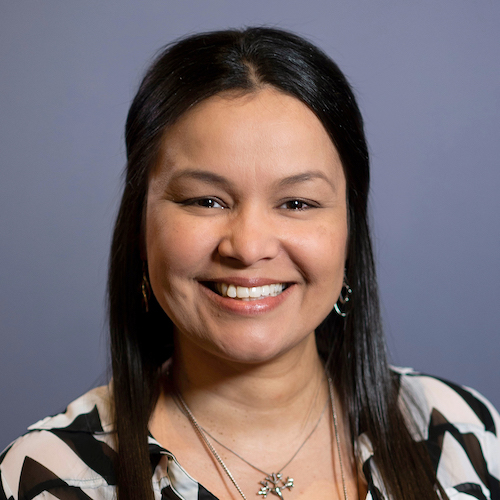
Lab Chief: Yarimar Carrasquillo, Ph.D.
Dr. Yarimar Carrasquillo joined the Pain Neurocircuitry and Cellular Plasticity Lab of the National Center for Complementary and Integrative Health (NCCIH) at the National Institutes of Health (NIH) as a tenure-track investigator in 2014. She became a tenured senior investigator in 2024. Her research program is focused on understanding the neural mechanisms underlying the physiological sensation of pain as well as the alterations that occur at the cellular and circuit levels that lead to pathological pain states.
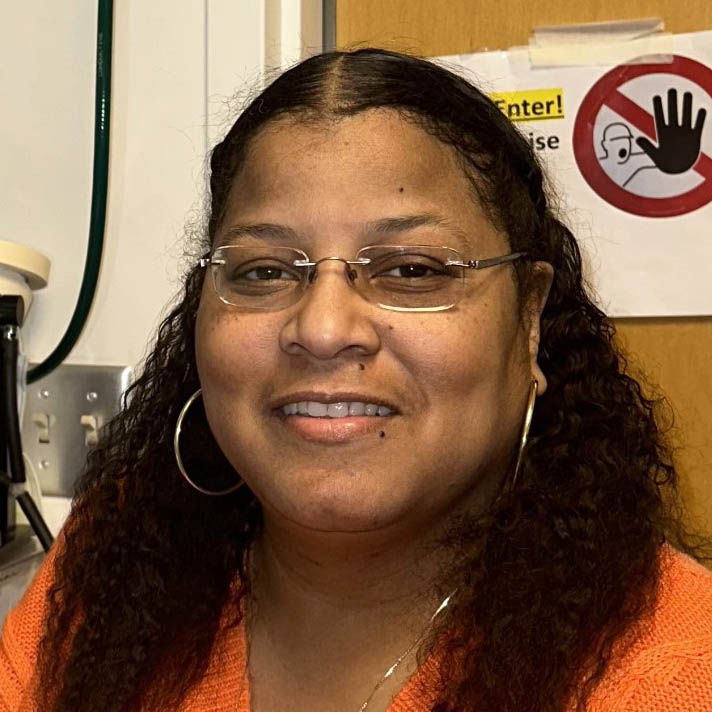
Torri Wilson, Lab Manager and Biologist
Torri Wilson is lab manager and biologist in the Pain Neurocircuitry and Cellular Plasticity Lab. Torri joined the lab in April 2014. She graduated from the Virginia State University in Petersburg in 1995 with a B.S. in animal sciences. Torri has extensive research experience as an animal biologist and is interested in expanding her knowledge of the amygdala and its role in modulating pain. While in the lab, Torri received the Director’s Merit Award for exemplary performance in the completion of the experiments that demonstrated the dual and opposite function of the central amygdala in pain. Torri has a passion for conducting surgeries and behavioral testing and assists with animal colony maintenance and laboratory management. Torri is currently working on parabrachial-central amygdala intersectional studies in the lab. She can be reached at torri.wilson@nih.gov.
Selected Publications:
- Rivera-García LG, Francis-Malavé AM, Castillo ZW, Uong CD, Wilson TD, Ferchmin PA, Eterovic V, Burton MD, Carrasquillo Y. Anti-hyperalgesic and anti-inflammatory effects of 4R-tobacco cembranoid in a mouse model of inflammatory pain. Journal of Inflammation. 2024;21(1):2.
- Torres-Rodriguez JM, Wilson TD, Singh S, Torruella-Suarez ML, Chaudhry S, Adke AP, Becker JJ, Neugebauer B, Lin JL, Martinez Gonzalez S, Soler-Cedeño O, Carrasquillo Y. The parabrachial to central amygdala circuit is a key mediator of injury-induced pain sensitization. Neuropsychopharmacology. 2024;49(3):508-520.
- Singh S, Wilson TD, Valdivia S, Benowitz B, Chaudhry S, Ma J, Adke AP, Soler-Cedeño O, Velasquez D, Penzo MA, Carrasquillo Y. An inhibitory circuit from central amygdala to zona incerta drives pain-related behaviors in mice. eLife. 2022;11:e68760.
- Francis-Malave AM, Martinez Gonzalez S, Pichardo C, Wilson TD, Rivera LG, Brinster LR, Carrasquillo Y. Sex differences in pain-related behaviors and clinical progression of disease in mouse models of visceral pain. bioRxiv. Preprint posted online January 12, 2022.
- Rivera-García LG, Francis-Malavé AM, Wilson TD, Ferchmin PA, Eterovic V, Carrasquillo Y. 4R-Tobacco-cembranoid is a positive allosteric modulator of the alpha7 nicotinic acetylcholine receptor that modulates inflammation-induced thermal hypersensitivity in mice. bioRxiv. Preprint posted online January 23, 2022.
- Singh S, Valdivia S, Soler-Cedeño O, Adke AP, Benowitz B, Velasquez D, Wilson TD, Carrasquillo Y. Bidirectional modulation of pain-related behaviors in the zona incerta. bioRxiv. Preprint posted online March 12, 2021.
- Wilson TD, Valdivia S, Khan A, Ahn H-S, Adke AP, Gonzalez SM, Sugimura YK, Carrasquillo Y. Dual and opposing functions of the central amygdala in the modulation of pain. Cell Reports. 2019;29(2):332-346.
- Adke AP, Khan A, Ahn H-S, Becker JJ, Wilson TD, Valdivia S, Sugimura YK, Gonzalez SM, Carrasquillo Y. Cell-type specificity of neuronal excitability and morphology in the central amygdala. eNeuro. 2021;8(1):ENEURO.0402-20-2020.
Trainees
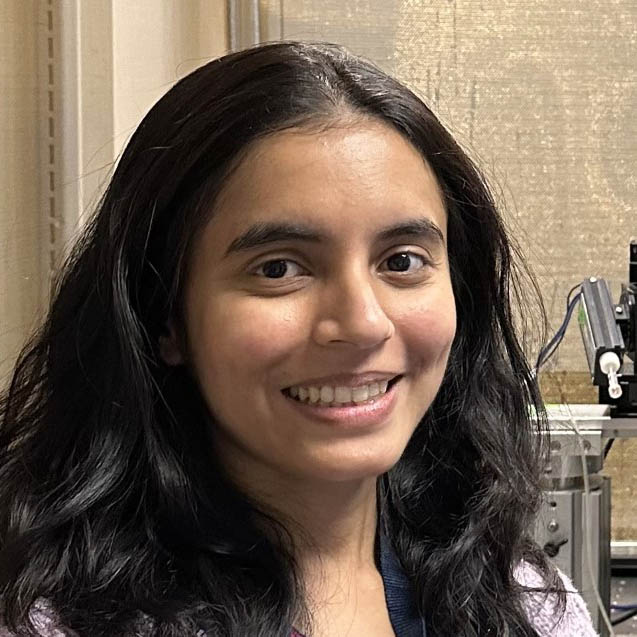
Nisa Roy, Ph.D., Visiting Postdoctoral Fellow
Nisa Roy, Ph.D., is a visiting postdoctoral fellow in the Pain Neurocircuitry and Cellular Plasticity Lab. Nisa graduated from University of Calcutta with a bachelor’s degree in zoology and a master’s in neuroscience. She earned her Ph.D. in neuroscience from Monash University in 2023. Her doctoral work revealed a potential link between a novel orphan G-protein coupled receptor, GPR139, and emotion-related cognitive impairment associated with psychiatric disorders. While in the lab, Nisa is interested in understanding the neural circuitry associated with stress-induced analgesia and the involvement of neuromodulators in alleviating pain-related behaviors. Her long-term goal would be to translate her basic science research to clinical practice, unearthing superior treatment strategies that might offer efficacy for pain management in multiple neurological and neuropsychiatric disorders. She is inspired and eager to inspire humanity through her research integrity. She can be reached at nisa.roy@nih.gov.
Selected Publications:
- Roy N, Parhar I. Habenula orphan G-protein coupled receptors in the pathophysiology of fear and anxiety. Neuroscience & Biobehavioral Reviews. 2022;132:870-883.
- Roy N, Ogawa S, Maniam R. et al. Habenula GPR139 is associated with fear learning in the zebrafish. Scientific Reports. 2021;11(1):5549.
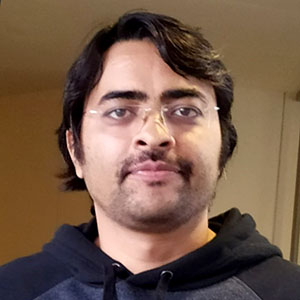
Sudhuman Singh, Ph.D., Visiting Postdoctoral Fellow
Sudhuman Singh, Ph.D., is a visiting postdoctoral fellow in the Pain Neurocircuitry and Cellular Plasticity Lab. He is interested in understanding the neural mechanisms underlying behavioral outputs and has trained in multidisciplinary research fields in neuroscience, including sleep, reinforcement learning, and pain. While at the National Center for Complementary and Integrative Health, Sudhuman is delineating the neural circuitry involved in pain modulation. Sudhuman was a 2020 finalist for the Mitchell Max Award for Research Excellence, NIH Pain Consortium Symposium, for his poster presentation, “Bidirectional modulation of pain-related behaviors in the zona incerta.” In 2021, he also earned a Fellowship from the Center on Compulsive Behaviors, NIH Intramural Research Program. He is passionate about science, and his motivation is to serve humanity through his research knowledge and life experiences. He can be reached at sudhuman.singh@nih.gov or 301-594-2477.
Selected Publications:
- Torres-Rodriguez JM, Wilson TD, Singh S, Torruella-Suarez ML, Chaudhry S, Adke AP, Becker JJ, Neugebauer B, Lin JL, Martinez Gonzalez S, Soler-Cedeño O, Carrasquillo Y. The parabrachial to central amygdala circuit is a key mediator of injury-induced pain sensitization. Neuropsychopharmacology. 2024;49(3):508-520.
- Singh S, Wilson TD, Valdivia S, Benowitz B, Chaudhry S, Ma J, Adke AP, Soler-Cedeño O, Velasquez D, Penzo MA, Carrasquillo Y. An inhibitory circuit from central amygdala to zona incerta drives pain-related behaviors in mice. eLife. 2022;11:e68760.
- Singh S, Valdivia S, Soler-Cedeño O, Adke AP, Benowitz B, Velasquez D, Wilson TD, Carrasquillo Y. Bidirectional modulation of pain-related behaviors in the zona incerta. bioRxiv. Preprint posted online March 12, 2021.
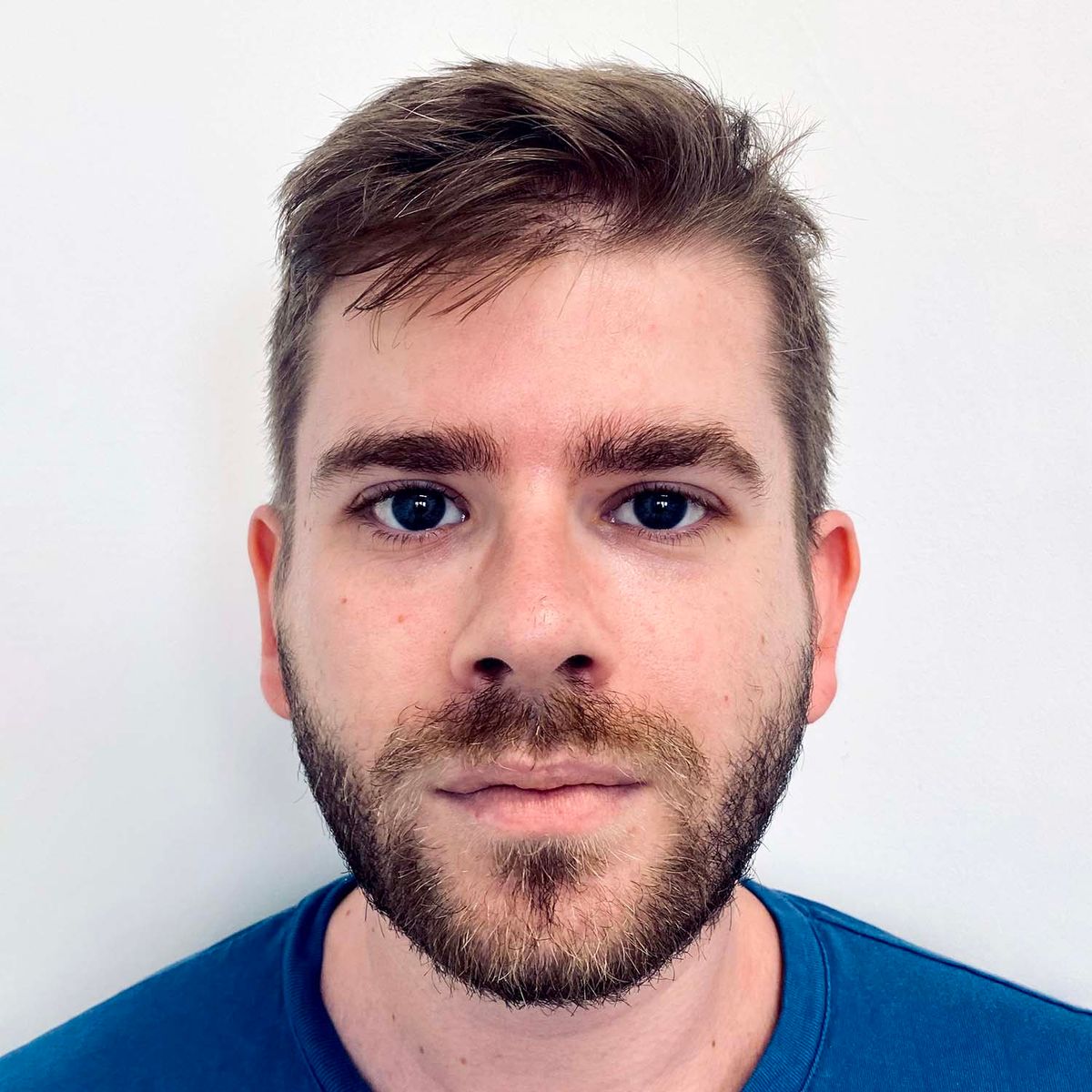
Maxime Thouaye, Visiting Postdoctoral Fellow
Maxime Thouaye is a visiting postdoctoral fellow in the Pain Neurocircuitry and Cellular Plasticity Lab. Maxime graduated from the University of Montpellier in France with a bachelor’s degree in animal physiology and neuroscience, and a master’s degree in neuroscience. In 2022, Maxime received his Ph.D. from the University of Montpellier. There, he worked in the lab of Dr. Cyril Rivat, exploring the interaction between the receptor tyrosine kinase FLT3 and the endogenous opioid system in pain sensitization and morphine side effects. He then moved on to a postdoc position in Dr. Ipek Yalcin’s lab, working on the comorbidity between chronic neuropathic pain and anxiodepression. Maxime is interested in studying the link between chronic pain and drug abuse, with a focus on the role of the central amygdala and the endogenous opioid system in these aspects.
Selected Publications:
- Tassou A, Thouaye M, Gilabert D, Jouvenel A, Leyris J-P, Sonrier C, Diouloufet L, Mechaly I, Mallié S, Bertin J, Chentouf M, Neiveyans M, Pugniere M, Martineau P, Robert B, Capdevila X, Valmier J, Rivat C. Activation of neuronal FLT3 promotes exaggerated sensorial and emotional pain-related behaviors facilitating the transition from acute to chronic pain. Progress in Neurobiology. 2023;222:102405.
- Jouvenel A, Tassou A, Thouaye M, Ruel J, Antri M, Leyris JP, Paquet A, Mallié S, Sar C, Diouloufet L, Sonrier C, Daubeuf F, Bertin J, Alves S, Ventéo S, Frossard N, Carroll P, Mechaly I, Rognan D, Sokoloff P, Dallel R, Delmas P, Valmier J, Rivat C. FLT3 signaling inhibition preserves opioid analgesia while abrogating tolerance and hyperalgesia. bioRxiv. Posted online March 18, 2023.

Jonathan Garcia, Postbac IRTA
Jonathan Garcia is a postbac IRTA in the Pain Neurocircuitry and Cellular Plasticity Lab. Jonathan graduated from the University of Maryland, College Park with a B.S in cellular and molecular neuroscience. Jonathan is interested in investigating the role of amygdala plasticity in persistent pain sensitization and pain-related behaviors. Jonathan previously worked in the Venniro lab at the University of Maryland School of Medicine, where he investigated neurobiological mechanisms of motivation in drug-seeking behaviors. He can be reached at jonathan.garcia3@nih.gov.

Se Rin Le, Postbac IRTA
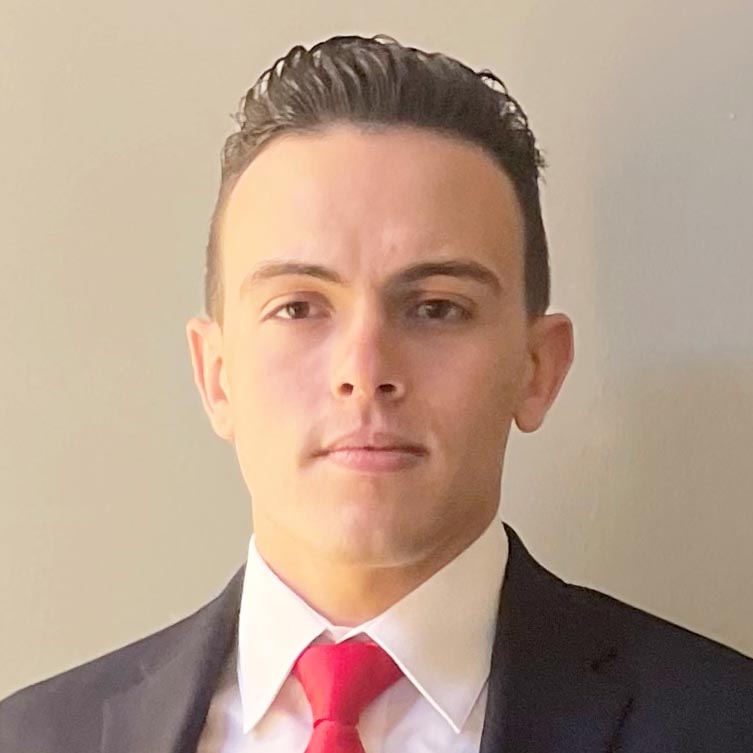
William Rosado, Postbac IRTA
William J. Fortún Rosado is a postbac IRTA in the Pain Neurocircuitry and Cellular Plasticity Lab, who was born and raised in Puerto Rico. William earned a B.S. (with honors) in biotechnology from the Universidad Ana G. Mendez Carolina. As an undergrad, he helped conduct research on environmental topics such as microbiological and heavy metal assessment, Discovery Base Research, and microalgae isolation and identification. William also took on leadership roles, including as president of the Honor chapter in his institution and as vice president in different chapters and organizations. He hopes to continue his studies and pursue a Ph.D. in gene therapy and, in the future, would like to take part in new biomedical procedures applications. William was born and raised on the “beautiful island of Puerto Rico.” His hobbies include participating in news and activities in the technology, aerospace, and gaming community. William can be reached at william.fortun@nih.gov.